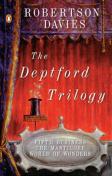BKMT READING GUIDES
The Deptford Trilogy
by Robertson Davies
Paperback : 825 pages
1 club reading this now
0 members have read this book
Ramsay is a man twice born, a man who has returned from the hell of the battle-grave at Passchendaele in World War I decorated with the Victoria Cross and destined to be caught in a no man's land where memory, history, and myth collide. As Ramsay tells his story, it begins ...
Introduction
Fifth Business
Ramsay is a man twice born, a man who has returned from the hell of the battle-grave at Passchendaele in World War I decorated with the Victoria Cross and destined to be caught in a no man's land where memory, history, and myth collide. As Ramsay tells his story, it begins to seem that from boyhood, he has exerted a perhaps mystical, perhaps pernicious, influence on those around him. His apparently innocent involvement in such innocuous events as the throwing of a snowball or the teaching of card tricks to a small boy in the end prove neither innocent nor innocuous. Fifth Business stands alone as a remarkable story told by a rational man who discovers that the marvelous is only another aspect of the real.
The Manticore
Around a mysterious death is woven a glittering, fantastical, cunningly contrived trilogy of novels. Luring the reader down labyrinthine tunnels of myth, history and magic, THE DEPTFORD TRILOGY provides an exhilarating antidote to a world from where 'the fear and dread and splendour of wonder have been banished'.
World of Wonders
This is the third novel in Davies's major work, The Deptford Trilogy. This novel tells the life story of the unfortunate boy introduced in The Fifth Business, who was spirited away from his Canadian home by one of the members of a traveling side show, the Wanless World of Wonders.
Editorial Review
"Who killed Boy Staunton?"This is the question that lies at the heart of Robertson Davies's elegant trilogy comprising Fifth Business, The Manticore, and World of Wonders. Indeed, Staunton's death is the central event of each of the three novels, and Rashomon-style, each circles round to view it from a different perspective. In the first book, Fifth Business, Davies introduces us to Dunstan Ramsey and his "lifelong friend and enemy, Percy Boyd Staunton," both aged 10. It is a winter evening in the small Canadian village of Deptford, and Ramsey and Boy have quarreled. In a rage, Boy throws a snowball with a stone in it, misses his friend and hits the Baptist minister's pregnant wife by mistake. She becomes hysterical and later that night delivers her child prematurely, a baby with birth defects. Even worse, she loses her mind. The snowball, the stone, the deformed baby christened Paul Dempster--this is the secret guilt that will bind Ramsey and Staunton together through their long lives:
I was perfectly sure, you see, that the birth of Paul Dempster, so small, so feeble, and troublesome, was my fault. If I had not been so clever, so sly, so spiteful in hopping in front of the Dempsters just as Percy Boyd Staunton threw that snowball at me from behind, Mrs. Dempster would not have been struck. Did I never think that Percy was guilty? Indeed I did.Boy, however, "would fight, lie, do anything rather than admit" he feels guilty, too, and so the subject remains unresolved between them right up until the night Boy's body is found in his car, in a lake, with a stone in his mouth. The second novel, The Manticore, follows Staunton's son, David, through a course of Jungian therapy in Switzerland, while World of Wonders concentrates on Magnus Eisengrim, a renowned magician and hypnotist with ties to both Ramsey and Boy Staunton.
When it came to writing, three was Davies's favorite number. Before the Deptford books, he wrote The Salterton Trilogy (Tempest-Tost, Leaven of Malice, A Mixture of Frailties), and after it came The Cornish Trilogy (The Rebel Angels, What's Bred in the Bone, The Lyre of Orpheus). Excellent as these and Davies's other novels are, The Deptford Trilogy is arguably the masterpiece for which he'll best be remembered, as the combination of magic, archetype, and good, old-fashioned human frailty at work in these novels is a world of wonders unto itself, and guarantees these three books a permanent place among the great books of our time. --Alix Wilber
Discussion Questions
No discussion questions at this time.Book Club Recommendations
Recommended to book clubs by 0 of 0 members.
Book Club HQ to over 88,000+ book clubs and ready to welcome yours.
Get free weekly updates on top club picks, book giveaways, author events and more








